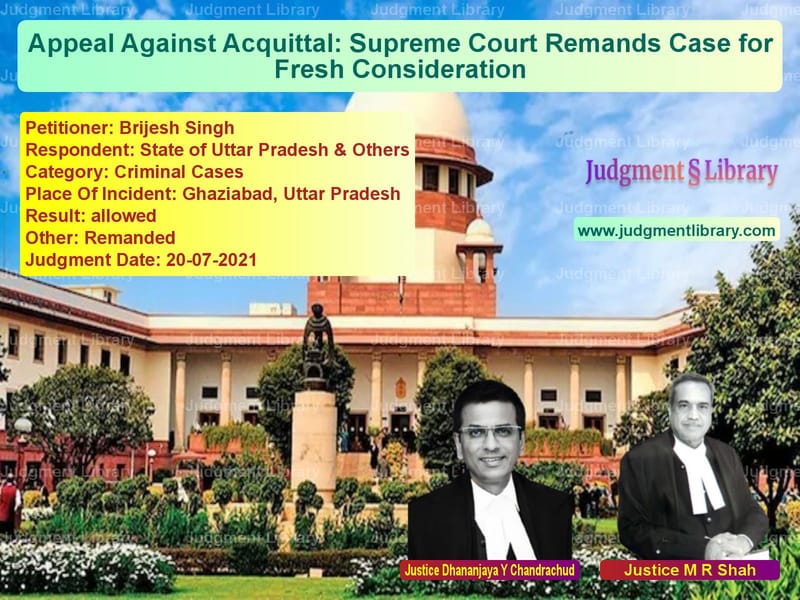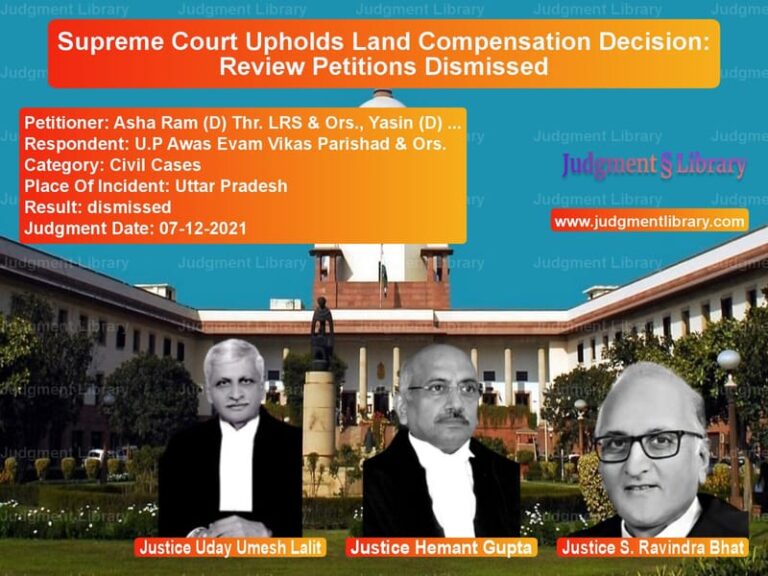Appeal Against Acquittal: Supreme Court Remands Case for Fresh Consideration
The Supreme Court of India, in the case of Brijesh Singh vs. State of Uttar Pradesh & Others, ruled on the procedural requirements for granting leave to appeal against an acquittal. The judgment clarifies that High Courts must apply judicial reasoning while deciding whether to allow appeals against acquittal and cannot reject them summarily without due analysis.
The ruling holds significance as it reinforces the legal standard that acquittal appeals must be evaluated on their merits, with a careful review of evidence, rather than being dismissed solely on the ground that the trial court’s view is a ‘possible view.’
Background of the Case
The case originated from the Ghaziabad Sessions Court, where six accused individuals were tried for offenses under:
- Section 302 read with Section 149 (murder with unlawful assembly) of the Indian Penal Code (IPC).
- Section 304B (dowry death) of the IPC.
- Section 498A (cruelty by husband or relatives) of the IPC.
- Sections 3 and 4 of the Dowry Prohibition Act.
On August 14, 2014, the Additional Sessions Judge acquitted all the accused. Aggrieved by the acquittal, the appellant, Brijesh Singh, who was the original informant, sought leave to appeal in the Allahabad High Court. However, the High Court dismissed the leave to appeal application, stating that:
Read also: https://judgmentlibrary.com/supreme-court-cancels-bail-of-accused-in-brutal-murder-case/
“Simply because another view might have been taken of the evidence provides no ground for interfering with the order of acquittal unless the view taken by the trial judge is not a possible view.”
Challenging this dismissal, the appellant approached the Supreme Court, arguing that the High Court had failed to scrutinize the trial court’s findings as required under Section 378 of the Code of Criminal Procedure, 1973 (CrPC).
Key Legal Issues
- Whether the High Court erred in summarily rejecting the appeal against acquittal.
- Whether the High Court was required to examine the evidence before dismissing the appeal.
- What standard should be applied in deciding leave to appeal against acquittals?
Petitioner’s Arguments
The appellant, Brijesh Singh, contended:
- The High Court failed to apply its judicial mind while rejecting leave to appeal.
- The trial court had ignored crucial evidence, which required fresh scrutiny.
- The law requires the appellate court to determine whether there were material errors in the trial court’s judgment.
- Without proper reasoning, a dismissal of leave to appeal defeats the purpose of judicial review in criminal cases.
Respondents’ Arguments
The respondents (the accused) argued:
- The trial court’s decision was based on a reasonable appreciation of evidence.
- The High Court had correctly applied the standard that acquittals should not be overturned unless they are perverse.
- There was no compelling reason to grant leave to appeal.
- The Supreme Court should not interfere with concurrent findings of acquittal.
Supreme Court’s Observations and Judgment
High Court Must Apply Judicial Mind
The Supreme Court ruled that the High Court must properly evaluate whether there is sufficient reason to grant leave to appeal:
“Merely stating that the trial judge’s view is ‘a possible view’ is not enough. The High Court must indicate its reasons, howsoever brief, for denying leave to appeal.”
Reaffirmation of Legal Principles
The Court referred to precedents, including:
- State of Madhya Pradesh vs. Giriraj Dubey (2013) – High Courts must provide reasons when rejecting leave to appeal.
- State of Maharashtra vs. Vithal Rao Pritirao Chawan (1981) – Reiterated that refusal to grant leave to appeal must be justified.
- State of Orissa vs. Dhaniram Luhar (2004) – Held that a trial court’s failure to assess evidence properly obligates the High Court to intervene.
Acquittals Require Close Scrutiny
The Supreme Court emphasized that appellate courts must carefully consider trial court judgments, especially in serious criminal cases:
“When dealing with crimes such as murder and dowry death, the High Court must ensure that the trial court’s reasoning is free from legal and factual errors.”
Remand for Fresh Consideration
The Supreme Court found that the High Court had failed to discharge its duty under Section 378 of the CrPC. It ruled:
“The High Court erred in dismissing the application without adequate reasoning. The matter is remanded for fresh consideration.”
Final Ruling
The Supreme Court set aside the High Court’s order and remanded the case for fresh evaluation. It directed the Allahabad High Court to reconsider the leave to appeal application and apply proper judicial scrutiny.
Key Takeaways from the Judgment
- High Courts must provide reasons – An appeal against acquittal cannot be dismissed in a cursory manner.
- Acquittals must be scrutinized – Even if another view is possible, the appellate court must analyze the trial court’s reasoning.
- Section 378 of CrPC must be followed – The standard for granting leave to appeal must be based on a review of evidence.
- Dowry death and serious offenses warrant higher scrutiny – The judiciary must ensure that such cases are not dismissed on technicalities.
Conclusion
The Supreme Court’s ruling in Brijesh Singh vs. State of Uttar Pradesh reinforces the principle that appeals against acquittals must be treated with due diligence. It ensures that High Courts do not summarily reject such appeals without providing proper reasons.
By remanding the case for fresh consideration, the judgment strengthens the appellate review process and ensures that acquittals are subjected to proper judicial scrutiny before being upheld.
Petitioner Name: Brijesh Singh.Respondent Name: State of Uttar Pradesh & Others.Judgment By: Justice Dhananjaya Y Chandrachud, Justice M R Shah.Place Of Incident: Ghaziabad, Uttar Pradesh.Judgment Date: 20-07-2021.
Don’t miss out on the full details! Download the complete judgment in PDF format below and gain valuable insights instantly!
Download Judgment: brijesh-singh-vs-state-of-uttar-prade-supreme-court-of-india-judgment-dated-20-07-2021.pdf
Directly Download Judgment: Directly download this Judgment
See all petitions in Bail and Anticipatory Bail
See all petitions in Dowry Cases
See all petitions in Legal Malpractice
See all petitions in Public Interest Litigation
See all petitions in Judgment by Dhananjaya Y Chandrachud
See all petitions in Judgment by Mukeshkumar Rasikbhai Shah
See all petitions in allowed
See all petitions in Remanded
See all petitions in supreme court of India judgments July 2021
See all petitions in 2021 judgments
See all posts in Criminal Cases Category
See all allowed petitions in Criminal Cases Category
See all Dismissed petitions in Criminal Cases Category
See all partially allowed petitions in Criminal Cases Category







